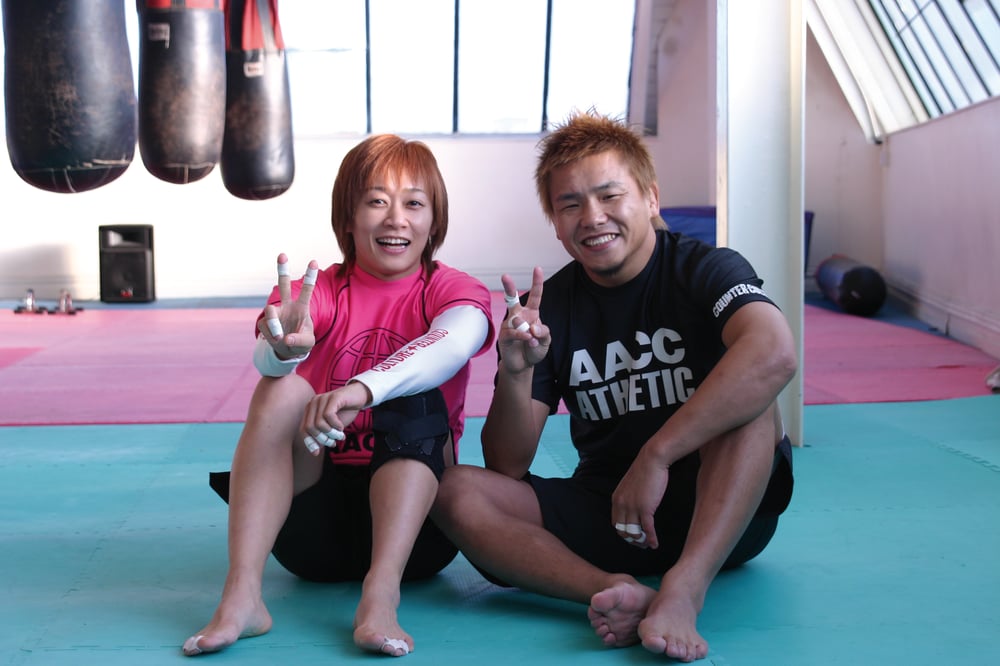
Issue 010
December 2005
With a relatively discreet Mixed Martial Arts (MMA) record of 4-0-0, Megumi Fujii is something of a phenomenon. One of the poster girls for Japanese female MMA and a veteran of SmackGirl and G-Shooto, she is one of the most well-known stars of Female MMA both in Japan and around the world. Meguji, as she is also known, features in countless MMA, fitness and lifestyle magazines in Japan. Her high profile status and countless successes mean this member of the Abe Ani Combat Club enjoys great favour from Japanese MMA fans.
A highly accomplished grappler with many years of experience, she holds multiple national championships in Sambo and grappling, and she placed third in her weight class in the inaugural ladies division at the 2005 Abu Dhabi Combat Club (ADCC) Submission Wrestling World Championships. She has beaten international opponents such as Erica Montoya, Michelli Tavares and Nadia Van Der Wel.
On her first visit to England Megumi and her coach and partner Hiroyuki Abe held a submission grappling seminar in the Yorkshire town of Bradford. The air of Northern England obviously appeals to her. “The air is very clean here, not like in Tokyo!” she remarked.
Of her four wins in MMA two have been by submission. Her third place in ADCC was in one of the most competitive divisions in the tournament. With her background in Judo, Sambo and submission grappling, I asked her which she preferred. “MMA is fun,” said Megumi. “Submission is different, but also fun. I enjoy both, so I can’t really say which one I
enjoy more.”
There have been rumours that Megumi was to return to the promotion SmackGirl, but she dispelled these as conjecture. “SmackGirl has no striking to the head on the ground. As a whole package of MMA, I feel ground ‘n’ pound and ground fighting should be allowed. SmackGirl has restrictions on the ground — I don’t want that. When I fought on SmackGirl I asked if they would change the rules to allow striking on the ground. G-Shooto [the female version of Shooto] allows ground ‘n’ pound. I’ll only go back to SmackGirl if they allow the rule change.”
With three MMA fights in 2004, it’s interesting to note that she had only taken one fight earlier this year. I asked why this was. “I fought MMA in March, but then fought in ADCC. There were plans to fight Leka Viera (Brazilian Jiu-Jitsu black belt) in a challenge fight but it was cancelled”. It is still unclear why Viera pulled out as no reason was ever given for
the cancellation.
In conversation with Megumi and Abe one of the reasons for Megumi’s success became clear. “There are quite a lot of women training at our gym, and five of those are pro fighters.” Training with other women is key for Meguji — as she says, why should she train with men if she doesn’t need to? “I’m going to fight against a woman. A woman has a more flexible body and has certain physical characteristics a man doesn’t. You have to get used to fighting other women.”
It is interesting to hear from someone qualified to comment that the ever-growing ladies MMA scene in Japan isn’t so different to that in Europe or the US. “At the moment there is a difference in level between professionals and others. There are constant events for women, and the number of women doing MMA is increasing. As the level of fighters improves more people will start watching it, so I think women’s MMA in Japan will get bigger.”
She admits that while she follows MMA in general on the Internet, her knowledge of the international female MMA scene is limited, but an encounter with top UK female fighter Rosi Sexton has inspired her to keep an eye on what’s happening. “I wasn’t really expecting any women to come today. I trained with Rosi Sexton today, so I’m going to start following UK ladies MMA.”











